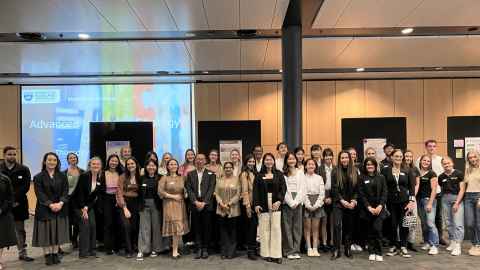Third-year marketing students strategise for their capstone projects
27 October 2022
Marketing students work together to solve industry challenges in this year's Marketing Strategy Showcase.

Last week, selected students from the Business School’s Marketing 301 course presented their capstone projects at the Marketing Strategy Showcase.
Marketing 301: Advanced Marketing Strategy involves an integrated capstone experience which fosters student-centred learning. The course develops knowledge on how to analyse, implement and evaluate marketing strategies, and nurtures a strong appreciation for how marketing connects and relates to other business disciplines.
Working in teams of five to six over the course of the semester, the students decide on which industry and businesses they feel most passionate about and embark on a strategic marketing analysis of the company and the broader sector.
Student teams then identify and recommend three key strategic decisions they believe would be best for the company.
Student findings are written up in a report summarising three key strategic recommendations which are then delivered to the academic staff as a ten-minute presentation. The best team projects are invited to present their project at the final week Marketing Strategy Showcase at the University of Auckland Business School.
It was so inspiring to see such a range of articulate, well-thought-out projects.
Dr Herbert Sima, Subject Group Lead in Marketing, and course director praised the students for the high calibre of work presented at the Showcase.
“The amount of hard work and time the students have dedicated to this is very clear in their final projects. I’m incredibly impressed by the standard of the projects, as well as how well they have represented themselves during the presentations.”
The winning group, Group Five, chose Suntory’s Boss Coffee as their business. They highlighted the three main challenges the brand faces: current coffee culture within New Zealand which lends itself to people choosing to drink coffee at a café as opposed to a ready-to-drink coffee, Boss Coffee’s lack of dairy-free options, and the company’s lack of sustainability and ethical credibility.
The group suggested that Boss Coffee engage in below the line marketing to increase their market share in New Zealand, as a solution to the first challenge. This will include product sampling in high density areas, partnerships with organisations and point-of-sale in-store activations.
They also recommend that Boss Coffee expands their product range to include dairy-free options with oat, soy, or almond milk, and advertise the new dairy-free range on social media platforms.
Lastly, they propose that the brand becomes Fairtrade certified to ally themselves with the consumer shift towards supporting sustainable and ethical brands.
There were two other winners on the night. Group 14 chose Kami, the learning app, as their business, and Group 21 chose Afends, the sustainable fashion brand as theirs, coming second and third, respectively.
The judges this year were made up of Business School academics and industry experts.
Helen Simpson, Marketing Adviser at the Business School, and judge at this year’s Showcase, shared her insights of this year’s projects. “It was so inspiring to see such a range of articulate, well-thought-out projects. I was really impressed by the quality of the student's work.”
The course is held once a year, and available to all Stage III marketing students.